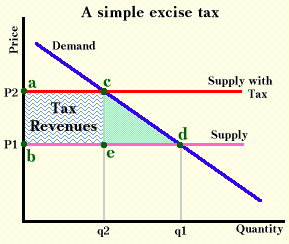Rent Seeking
The effects of a tariff, which is an excise tax on imported items, are the same as any excise tax: the tariff will raise price, reduce quantity, and decrease the consumers' surplus. A quota is a restriction of imports that also raises price, reduces quantity, and decreases the consumers' surplus. For example, in 1985, the world price of sugar was a bit over three cents a pound, whereas the U.S. price was more than six times the world level. This price differential existed because only 2.677 million tons of foreign sugar were allowed into the U.S. A tariff could produce the same price differential, but unlike a tariff, a quota produces no revenue for the government.
The right to sell sugar in the U.S. has been valuable. One who had that right could buy sugar at the world price and sell it in the U.S. for six times as much. It would seem that import quotas create a windfall gain for the lucky few who have government permission to import. Sometimes they do. But the situation may be more complex.
When the right to import--to buy a product cheaply in the foreign market and to sell it dear in the domestic market--is valuable, there should be competition for that right. This competition may take the form of campaign contributions, lobbying, or spending money to prepare proposals submitted to a government bureaucracy. Economic resources are used to obtain this governmentally created right, and as a result, there is not merely a transfer from one group to another, as happens with the tariff illustrated below. The actual social loss is not only the triangular area c-d-e in the graph below, but also the resources spent in competition for the surplus a-c-b-e.

In their quest for value, people choose between two paths. They can obtain value through exchange by providing a good or service that others consider valuable. Alternatively, they can seek to have value transferred to them without providing anything in return. The first path is one of profit seeking, and it has the desirable side effect of forcing people to serve the public by providing products the public wants at prices they will pay. The second path has become known as rent seeking, a term descriptive only to those who know something of the history of economic analysis. Unlike profit seeking, rent seeking has no desirable side effect, but rather can cause a serious waste of society's scarce resources. In different terms, profit seeking is a positive-sum game, whereas rent seeking is a negative-sum game.
Rent seeking often involves government because governments transfer huge amounts of money for which people can compete. For an example of the forces involved, consider a government agency that gives grants to colleges for equipment to improve teaching. Suppose that a program gives grants averaging $40,000. This money, which has been taken from taxpayers, is not given randomly, but is distributed on the basis of a competition of grant proposals. If one in ten proposals wins (a realistic assumption for many grants) and if the average proposal costs $2000 to prepare (also realistic given the value of time of faculty members, professional grant writers, and secretaries needed to prepare a proposal), then colleges will use resources worth $20,000 for each $40,000 they obtain.1 The end result is that the government is not simply taking $40,000 from one person's pocket and putting it into another person's pocket. There is also a use of resources worth $20,000 to switch this money from one pocket to another.
Rent seeking can occur whenever people can compete for some existing value. Many interesting cases involve the government because the government can use force in ways that no private citizen or group of citizens can, and that use of force can be made to enrich some at the expense of others.2 Rent seeking includes competition for subsidies, for special jobs, and for exclusive rights to produce or sell products. Economists often assume that transfers simply redistribute income, with at most a small welfare loss. The topic of rent seeking seriously questions this assumption. If rent seeking is important enough in a society--if too much effort of those who have talent and desire is channeled into rent seeking rather than profit seeking--serious harm can be done to a country's growth and development.
Finally, the basic insights of the self-interested view of government and rent seeking suggest that societies based on free markets and democratic governments are unusual and exceptional. Indeed, what is somewhat difficult to explain is how democratic market societies manage to begin and continue to exist. It would not seem to be in the interests of those with government power to allow them to begin, but the self-interest view says that it must have been. On the other hand, these insights help explain the endurance of socialism (the absence of significant private ownership of productive resources, which means that all decision-makers are government employees), despite its poor record in improving the lot of the average citizen. Socialism concentrates decisions at the center of a society and thus increases the power of government officials compared to what it would be with a market economy.
1In most competitions, some people or colleges have a much better than a one-in-ten chance, and others have a worse than a one-in-ten chance. If it cost all entrants $2000 to prepare a proposal, the competition described above would not attract anyone with less than one-in-twenty chance of winning.
2 Other interesting examples are theft and civil suits in the legal system (which does involve the government to some extent).
Copyright Robert Schenk